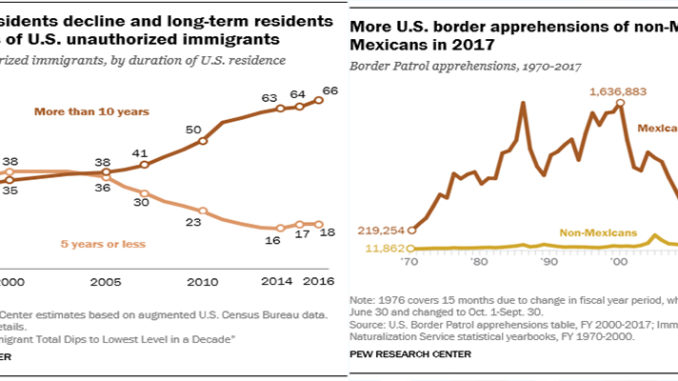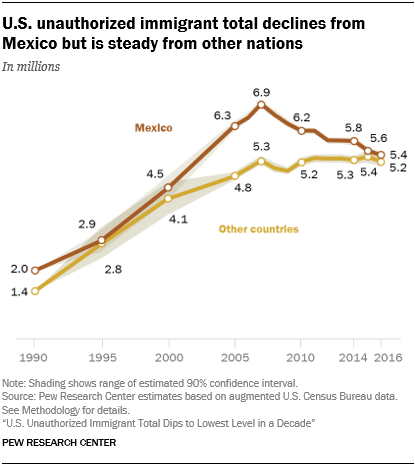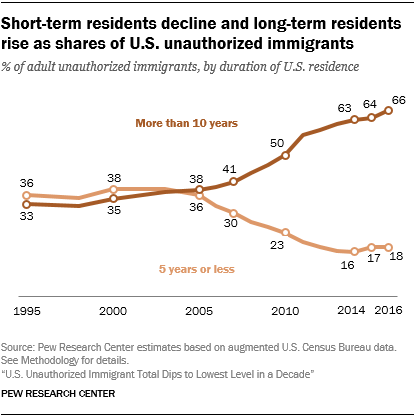
by and
There were 12.0 million immigrants from Mexico living in the United States in 2016, and fewer than half of them (45%) were in the country illegally, according to Pew Research Center estimates. Mexico is the country’s largest source of immigrants, making up 26.6% of all U.S. immigrants.
With President Donald Trump’s administration taking steps to reduce the number of unauthorized immigrants in the U.S. – including through the increase of law enforcement agents at the southern border – here’s what we know about illegal immigration from Mexico.
 1 The number of Mexican immigrants living in the U.S. illegally has declined by more than 1 million since 2007. In 2016, 5.4 million unauthorized immigrants from Mexico lived in the U.S., down from a peak of 6.9 million in 2007. Despite the drop, Mexicans still make up about half of the nation’s 10.7 million unauthorized immigrants (51% in 2016).
1 The number of Mexican immigrants living in the U.S. illegally has declined by more than 1 million since 2007. In 2016, 5.4 million unauthorized immigrants from Mexico lived in the U.S., down from a peak of 6.9 million in 2007. Despite the drop, Mexicans still make up about half of the nation’s 10.7 million unauthorized immigrants (51% in 2016).
2 There were more apprehensions of non-Mexicans than Mexicans at U.S. borders in fiscal year 2017 for the third time on record (the first was in fiscal 2014). In fiscal 2017, the Border Patrol made 130,454 apprehensions of Mexicans, a sharp drop from a peak of 1.6 million apprehensions in 2000. The decline in apprehensions reflects the decrease in the number of unauthorized Mexican immigrants coming to the U.S.
There were more apprehensions of non-Mexicans than Mexicans at U.S. borders in fiscal year 2017 for the third time on record (the first was in fiscal 2014). In fiscal 2017, the Border Patrol made 130,454 apprehensions of Mexicans, a sharp drop from a peak of 1.6 million apprehensions in 2000. The decline in apprehensions reflects the decrease in the number of unauthorized Mexican immigrants coming to the U.S.
3 Mexicans were deported from the U.S. 245,306 times in 2016 – up from 169,031 in 2005, but down from a recent high of 308,828 in 2013. The increase over the past decade is due in part to a 2005 shift in policy that increased the chances of being deported following apprehension in the border region. Prior to that change, many unauthorized immigrants were returned without a formal deportation order.
 4 Mexican unauthorized immigrant adults are more likely to be long-term residents of the U.S. As of 2016, 80% had lived in the U.S. for more than 10 years, while only 8% had been in the country for five years or less. By comparison, 52% of unauthorized immigrant adults from countries other than Mexico had lived in the U.S. a decade or more as of 2016, while 28% had lived in the U.S. for five years or less. (This analysis also slightly revises earlier estimates published by Pew Research Center.)
4 Mexican unauthorized immigrant adults are more likely to be long-term residents of the U.S. As of 2016, 80% had lived in the U.S. for more than 10 years, while only 8% had been in the country for five years or less. By comparison, 52% of unauthorized immigrant adults from countries other than Mexico had lived in the U.S. a decade or more as of 2016, while 28% had lived in the U.S. for five years or less. (This analysis also slightly revises earlier estimates published by Pew Research Center.)



